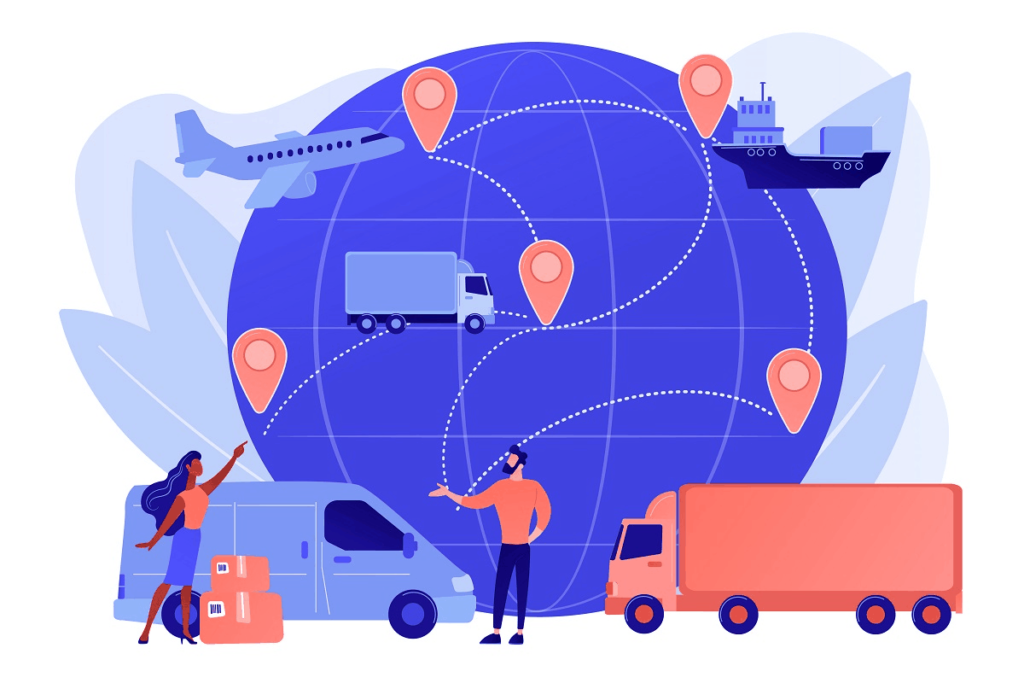Editorial Note: We are an inventory management software provider. While some of our blog posts may highlight features of our own product, we strive to provide unbiased and informative content that benefits all readers.
Third-Party Logistics (3PL) refers to the outsourcing of logistics and supply chain management functions to a third-party provider. This provider can offer a range of services, including transportation, warehousing, inventory management, order fulfillment, and other related activities.
The goal of 3PL is to improve the efficiency and effectiveness of logistics and supply chain operations while allowing companies to focus on their core competencies. 3PL providers can operate domestically or internationally and may offer a range of value-added services, such as customs brokerage, packaging, and reverse logistics.

Importance of 3PL for Modern Business:
The importance of Third-Party Logistics (3PL) for modern business lies in the fact that it can provide a range of benefits to companies looking to streamline their logistics and supply chain operations. Some of the key reasons why 3PL is important include:
- Cost savings: By outsourcing logistics functions to a 3PL provider, companies can reduce their costs associated with warehousing, transportation, and labor.
- Improved efficiency: 3PL providers have the expertise and technology to optimize logistics operations and improve efficiency, which can lead to faster order processing times, reduced lead times, and better inventory management.
- Access to specialized expertise: 3PL providers have specialized knowledge and resources that can be difficult for companies to develop in-house, such as customs clearance expertise, global logistics expertise, and specialized equipment.
- Expansion into new markets: 3PL providers can help companies expand their reach into new markets by providing access to new transportation routes, warehousing facilities, and distribution networks.
- Reduction in risk and liability: 3PL providers assume a portion of the risk and liability associated with logistics and supply chain operations, which can help companies reduce their exposure to risk.
3PL is important for modern businesses because it can provide a range of benefits that can help companies improve their logistics operations, reduce costs, and stay competitive in today’s fast-paced business environment.
The Benefits of Outsourcing Logistics to a 3PL Provider:
Outsourcing logistics functions to a Third-Party Logistics (3PL) provider can offer a range of benefits to companies. Some of the key benefits of outsourcing logistics to a 3PL provider include:
- Cost savings: 3PL providers have the expertise and technology to optimize logistics operations and reduce costs associated with warehousing, transportation, and labor.
- Improved efficiency: 3PL providers have the resources and technology to streamline logistics operations, which can lead to faster order processing times, reduced lead times, and better inventory management.
- Access to specialized expertise: 3PL providers have specialized knowledge and resources that can be difficult for companies to develop in-house, such as customs clearance expertise, global logistics expertise, and specialized equipment.
- Expansion into new markets: 3PL providers can help companies expand their reach into new markets by providing access to new transportation routes, warehousing facilities, and distribution networks.
- Reduction in risk and liability: 3PL providers assume a portion of the risk and liability associated with logistics and supply chain operations, which can help companies reduce their exposure to risk.
- Scalability: 3PL providers can adjust their services to meet the changing needs of a company, whether it’s to accommodate seasonal fluctuations or rapid growth.
- Focus on core competencies: By outsourcing logistics functions to a 3PL provider, companies can focus on their core competencies and leave logistics management to the experts.
Outsourcing logistics to a 3PL provider can help companies reduce costs, improve efficiency, access specialized expertise, expand into new markets, reduce risk and liability, and stay focused on their core competencies.
Types of 3PL Providers and Their Services:
Third-Party Logistics (3PL) providers can offer a range of logistics and supply chain management services. The types of 3PL providers and their services include:
Transportation providers: These providers specialize in transportation services, including trucking, shipping, air cargo, and rail. Transportation providers may offer a range of value-added services, such as customs clearance and freight forwarding.
Warehouse and distribution providers: These providers specialize in warehousing and distribution services, including inventory management, order fulfillment, and shipping. Warehouse and distribution providers may also offer value-added services, such as pick and pack, kitting and assembly, and returns processing.
Freight forwarders: These providers specialize in international shipping and logistics, including customs clearance, documentation, and compliance. Freight forwarders may also offer value-added services, such as freight consolidation and deconsolidation.
Integrated providers: These providers offer a range of logistics and supply chain management services, including transportation, warehousing, and distribution. Integrated providers may also offer value-added services, such as inventory management, order fulfillment, and returns processing.
Financial and information-based providers: These providers offer financial and information-based services, such as freight payment and auditing, supply chain analytics, and transportation management software.
The services offered by 3PL providers can vary widely depending on the provider and the needs of the company. Some 3PL providers may offer a full range of logistics services, while others may specialize in a particular type of service or industry. It’s important for companies to evaluate their logistics needs and choose a 3PL provider that can meet those needs and provide value-added services.
Factors to Consider When Choosing a 3PL Provider:
When choosing a Third-Party Logistics (3PL) provider, companies should consider several factors to ensure they choose a provider that meets their needs and can provide value-added services. Some of the key factors to consider when choosing a 3PL provider include:
- Expertise: It’s important to choose a 3PL provider that has expertise in the type of logistics services required by the company. For example, if the company needs international shipping and customs clearance services, it’s important to choose a 3PL provider with experience in those areas.
- Technology: A 3PL provider with modern logistics technology can help improve efficiency and reduce costs. Companies should consider whether the provider has the technology needed to meet their logistics needs, such as warehouse management systems, transportation management systems, and real-time tracking and reporting.
- Scalability: Companies should choose a 3PL provider that can adjust their services to meet changing business needs. Whether it’s to accommodate seasonal fluctuations or rapid growth, the provider should be able to scale their services accordingly.
- Flexibility: It’s important to choose a 3PL provider that can provide customized logistics solutions tailored to the company’s specific needs. The provider should be able to adapt their services to the company’s requirements, rather than offering a one-size-fits-all solution.
- Reputation: Companies should research the reputation of potential 3PL providers and consider factors such as customer satisfaction, service quality, and on-time delivery performance.
- Cost: While cost is an important factor, it should not be the sole consideration when choosing a 3PL provider. Companies should evaluate the overall value provided by the provider, including their expertise, technology, scalability, and flexibility.
Companies should carefully evaluate potential 3PL providers based on their expertise, technology, scalability, flexibility, reputation, and cost to ensure they choose a provider that can meet their logistics needs and provide value-added services.
Common Challenges in Working With a 3PL Provider and How to Overcome Them:
Working with a Third-Party Logistics (3PL) provider can present several challenges, but there are steps companies can take to overcome these challenges. Some common challenges in working with a 3PL provider and how to overcome them include:
Communication: Effective communication is essential for a successful 3PL relationship. Challenges can arise when there is a lack of clear communication between the company and the 3PL provider. To overcome this challenge, companies should establish regular communication channels, define expectations and performance metrics, and ensure that both parties are aligned on their objectives.
Integration: Integrating a 3PL provider’s systems and processes with a company’s systems and processes can be challenging. To overcome this challenge, companies should work with their 3PL provider to establish a clear plan for integration, including data exchange protocols, system compatibility, and data security.
Service quality: Service quality is a critical factor in any 3PL relationship. To ensure service quality, companies should establish clear performance metrics and expectations, and regularly monitor and evaluate the 3PL provider’s performance. It’s also important to establish a clear process for addressing any service quality issues that arise.
Cost: Cost is an important consideration when working with a 3PL provider. To overcome cost challenges, companies should establish clear pricing models and service level agreements, and regularly evaluate the 3PL provider’s pricing and service quality relative to other providers in the market.
Culture fit: Working with a 3PL provider requires a good cultural fit between the company and the provider. To ensure a good cultural fit, companies should establish clear expectations for communication, collaboration, and decision-making, and work with their 3PL provider to establish a shared vision for the relationship.
Working with a 3PL provider can present challenges, but these challenges can be overcome with effective communication, clear performance metrics and expectations, a good integration plan, regular monitoring and evaluation of service quality and cost, and a shared vision for the relationship.
Case Studies of Successful 3PL Implementations:
There are many examples of successful Third-Party Logistics (3PL) implementations across various industries. Here are three case studies:
Unilever and DHL Supply Chain: In 2015, Unilever, a global consumer goods company, partnered with DHL Supply Chain to create a single distribution center for all of its products in the UK. The partnership aimed to improve efficiency and reduce costs by consolidating distribution, increasing capacity, and improving the accuracy of stock control. The partnership led to a 40% reduction in carbon emissions, a 50% reduction in road miles traveled, and a 25% increase in the accuracy of stock control.
Target and J.B. Hunt Transport Services: In 2019, Target, a US-based retail company, partnered with J.B. Hunt Transport Services to launch a new transportation and logistics operation. The partnership aimed to improve the speed and efficiency of Target’s supply chain, reduce transportation costs, and improve sustainability. The partnership led to a 15% reduction in transportation costs, a 20% reduction in carbon emissions, and a 30% increase in on-time deliveries.
Lenovo and DB Schenker: In 2019, Lenovo, a global technology company, partnered with DB Schenker to create a global logistics hub in Shanghai, China. The partnership aimed to improve Lenovo’s supply chain efficiency, increase flexibility, and reduce costs. The hub includes a state-of-the-art warehouse, transportation and logistics management, and customs clearance services. The partnership led to a 30% reduction in transportation costs, a 50% reduction in warehouse space, and a 25% increase in productivity.
These case studies demonstrate the value of 3PL partnerships in improving efficiency, reducing costs, increasing sustainability, and improving supply chain performance. By partnering with a 3PL provider, companies can access specialized logistics expertise, modern technology, and scalable services, leading to improved performance and better customer satisfaction.
Conclusion:
3PL providers enhance supply chain efficiency, cut costs, and improve customer satisfaction. Outsourcing logistics to a 3PL provider allows businesses to focus on core operations, while accessing specialized expertise, technology, and infrastructure. Companies must choose the right 3PL provider and establish clear performance metrics and communication channels. Successful 3PL implementations result in improved efficiency, lower costs, increased sustainability, and better supply chain performance.
Take a Quiz Test - Test Your Skill
Test your inventory management knowledge. Short multiple-choice tests, you may evaluate your comprehension of Inventory Management.
